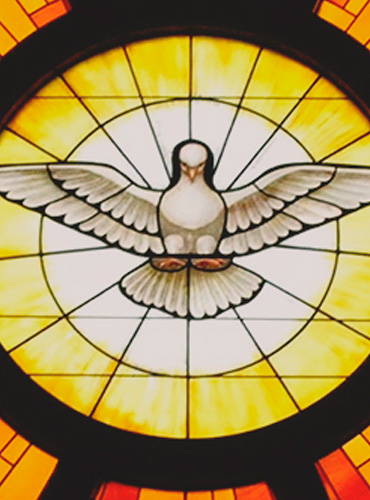Wednesday of the Sixth Week of Easter – Option 1 – Jn 16:12-15
In today’s Gospel Jesus continues the Last Supper discourse, telling His disciples about the Holy Spirit and His relation to Himself and to the Father. We can consider three phrases more in detail: first, Christ’s comment that the disciples cannot bear the whole truth now, second, that when the Spirit of Truth comes He will guide the disciples “to all truth,” and, thirdly, that everything the Father has is the Son’s and the Holy Spirit will take it and “declare” it to the disciples. So, bearing the truth, the Holy Spirit’s guidance, and the connection between the Father, the Son, and the Holy Spirit.
First, Christ tells His disciples, “I have much more to tell you, but you cannot bear it now.” The word for bear is a generic one, and it can mean simply to carry or endure, but also to pick up. Later, John uses the same verb to say that Jesus, “carrying the cross Himself,” went to Golgotha (19:17), and Luke recalls Christ using it to speak of the need to carry the cross (14:27). Of course, there were many things that Christ could’ve told His disciples: how most would die as martyrs, the sufferings they would endure, the rejections they would face, and so on. That would’ve been too much for them, though, and so He spares them. What’s interesting here, though, is the adverb used for now, ἄρτι. It means the present moment, here-and-now, but it’s always connected with the immediate past or future; it refers to something that’s either just coming to a close, or just beginning. Here, it means that the time in which the disciples can’t bear these things in coming to an end; it’s winding down, and, in the future, they will be able to endure them and carry their cross.[1]
So, what will change that will make this possible? This endurance and carrying is made possible by the Holy Spirit, our second point. “He will guide you to all truth,” Christ says. That verb guide literally means will show you the path or the way, and, as we know, Christ Himself is the Way and the Truth.[2] In those difficult moments, the disciples will have recourse to the Holy Spirit, who, no matter how bleak things might seem, will guide them to Christ.
This intimate connection is based, of course, on the consubstantiality of the Trinity, our third point. All that the Father has, or, as the Greek literally has it, all things whatsoever,[3] all the goodness, all the grace, all the strength, all the virtues, is Christ’s, and through the Holy Spirit it is given to the disciples. This is the way they can overcome the difficulties they face and adhere firmly to Christ’s path.
There are two lessons we can take away from this, two things that we should do: first, the need to entrust the future to God, and, second, the need to be docile to the Holy Spirit.
Regarding the first, Christ knew exactly what the disciples could handle and when. He knew absolutely everything that they would face and that, when the time came, they would be strong enough because He would provide them with what they needed when they needed it. There is no need to worry about the future, to think about the things we might be asked to do and maybe won’t be able to handle. God knows all of that, and He will give us the strength to handle it when it comes (if it comes).
Secondly, Christ promises to send the Holy Spirit precisely to guide us back to Himself. When we are docile to what God asks of us, we will have the experience that Saint Elizabeth of the Trinity recalls in one of her letters: “God fascinates you, He sweeps you away: under His gaze the horizon becomes so beautiful, so vast, so luminous. . . . It is through Him, by His radiance, that we must view and do everything! Live in Him! It is so simple!” (Letter 128) “Live in Him! It is so simple!”
Today, through the intercession of Mary, Spouse of the Holy Spirit, let us ask for the grace to be docile to the Holy Spirit, to live simply in Him, and thus draw near to Christ and the blessings He has prepared for us.
[1] See Vincent’s Word Studies and Thayer’s Greek Lexicon Strong’s NT 737: ἄρτι
[2] Strong’s Exhaustive Concordance: guide, lead. From hodegos; to show the way (literally or figuratively (teach)) — guide, lead.
[3] Cambridge Bible for Schools and Colleges





